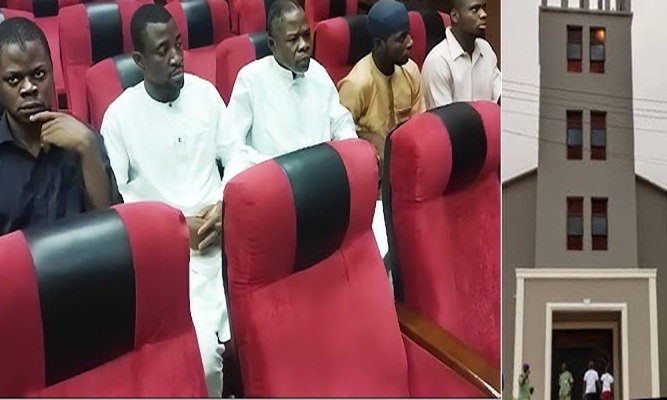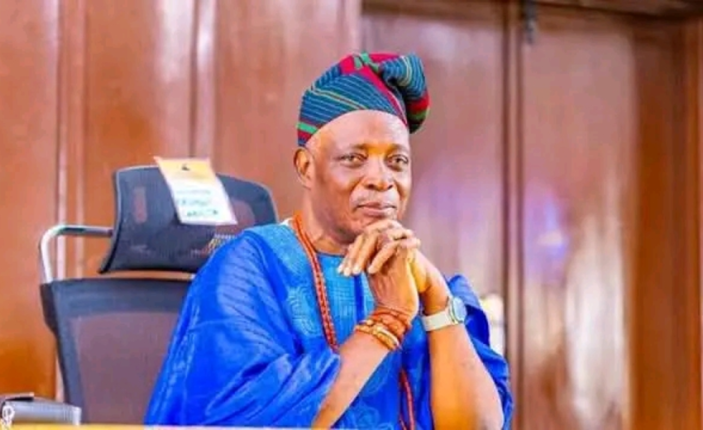The Commissioner of Police for the Federal Capital Territory (FCT), Ajao Adewale, called on journalists across the country to step up their role in the fight against illegal mining, warning that the practice, as a menace, is a major driver of insecurity, economic sabotage, and environmental degradation in the country.
Adewale made the call on Wednesday in Abuja during a workshop/media parley organised by the Nigeria Union of Journalists (NUJ), FCT Council on “The Fight Against Illegal Mining: Role of the Media.”
“Illegal mining is not just a mere economic crime; it fuels insecurity, undermines lawful investment, and robs our nation of vital resources,” he said.
Citing figures from the Nigeria Extractive Industries Transparency Initiative (NEITI), the police chief disclosed that Nigeria loses up to $9 billion (about N13.7 trillion) annually to illegal mining and gold smuggling.
He said these losses not only deplete foreign exchange earnings and tax revenues but also lead to devastating indirect costs such as land and water degradation, community displacement, and health hazards.
On the security front, Adewale noted that illegal mining is directly linked to rising violence in states such as Zamfara, Katsina, Niger, and even parts of the FCT, where bandit groups derive funding from the control of mineral resources.
He warned that this has helped sustain banditry, kidnappings, and terrorism across the country.
He added that intelligence reports and raids have shown that illegal mining is being driven by powerful Nigerians who use foreigners as fronts, echoing earlier revelations by the Minister of Solid Minerals Development, Dele Alake.
According to him, recent hotspots include Zamfara (gold), Nasarawa (lithium), Kogi (gold and others), and corridors in Kaduna, Niger, Kwara, and Osun States, where raids have also uncovered cases of child labour in mining sites.
Within the FCT, illegal mining has been reported in Gwagwalada, Asokoro, Gaube, Kuje, and Katampe Extension.
He disclosed that joint operations by the Police, NSCDC, and EFCC had led to the arrest of at least 72 suspects between 2023 and 2024.
Adewale commended the FCT Minister, Chief Nyesom Wike, for ordering a clampdown on illegal mining operations in Abuja, stressing that decisive action was needed to protect the capital city from criminal infiltration.
He further outlined the role of journalists in tackling the problem, which includes engaging communities around mining sites, building secure whistleblowing networks, sharing geo-located intelligence with security agencies, and conducting data-driven investigations to expose shell companies and financial flows that sustain cartels.
“Illegal mining robs Nigeria of its wealth, fuels insecurity, and empowers criminal cartels. But with the resolve of the security agencies and the vigilance of the media, this menace can be defeated,” the FCT Commissioner of Police declared.
He emphasised that only stronger collaboration between the media and law enforcement could ensure that Nigeria’s mineral resources are safeguarded for national development.
The Commander of the Mining Marshals, ACC A. J. Onoja, called on journalists to remain professional and objective in reporting on the fight against illegal mining, warning that sensational or biased reporting could undermine national efforts to secure Nigeria’s mineral resources.
Onoja said the establishment of the Mining Marshals, an elite enforcement unit of the Nigeria Security and Civil Defence Corps (NSCDC), was a decisive step by the Federal Government to sanitise the mining sector.
He explained that the unit, inaugurated under the administration of President Bola Tinubu and the leadership of the Minister of Solid Minerals Development, Dr. Dele Alake, was created to dismantle illegal mining networks, restore order in volatile mining corridors, and protect the nation’s mineral wealth from exploitation.
“Billions of naira in revenue have been lost, vast tracts of arable land degraded, and once peaceful communities destabilised by illicit mining activities. The Mining Marshals were established to reverse this trend, and I can assure you that progress is being made,” he said.
Onoja described the Mining Marshals as “an unusual enforcement unit” bound by a strict code of conduct and guided by legal instruments, including the Minerals and Mining Act of 2007 and the Mining Regulations of 2011.
He stressed that the Corps had revived long-neglected provisions of the law to strengthen enforcement, including sanctions for unregistered mineral movement and misuse of small-scale mining licenses.
According to him, the Mining Marshals have already dismantled several illegal camps, arrested offenders, and restored government authority in previously neglected corridors.
He said these actions have sent a clear message that Nigeria’s mineral wealth belongs to all Nigerians, not a select few.
However, he admitted the unit faces serious challenges, including inadequate logistics, difficult terrains, entrenched interests, and occasional resistance from communities influenced by illegal operators.
Onoja urged journalists to support the fight against illegal mining by exposing cartels, educating communities, and ensuring balanced coverage.
He appealed against what he described as “rogue journalism” that could weaken enforcement efforts, citing a past case in Nasarawa State where a media report allegedly misrepresented an operation and was sponsored by vested interests.
“We have identified the media as a very important partner in this fight, and we don’t want to be seen dragging anyone to court. But we will not fail to hold accountable anyone who unfairly attacks us through the media,” he said.
The commander emphasised that the role of the press in mobilising public opinion, enlightening communities, and countering misinformation was critical to achieving lasting reforms in the mining sector.
“The fight against illegal mining is a fight for our future. It is about safeguarding our environment, protecting livelihoods, and securing revenue for generations yet unborn. Together, with the media as our ally, we can ensure that Nigeria’s mineral wealth becomes a blessing,” Onoja said.
The National President of the Miners Association of Nigeria (MAN), Mr. Dele Ayanleke, urged journalists to sustain their role in the fight against illegal mining, stressing that the menace poses grave economic, environmental, and social threats to Nigeria’s future.
Ayanleke described illegal mining as “the unauthorised extraction of minerals, such as gold, lithium, tin, and sand, without licenses, permits, or compliance with regulations.”
He noted that the consequences of such activities extend beyond fiscal losses to include community displacement, child labour, environmental degradation, and public health crises.
“Illegal mining is persistent because of poverty, unemployment, high mineral demand, weak governance, and corruption. Short-term crackdowns are not enough. Sustained efforts are needed to protect communities, safeguard the environment, and foster long-term reforms,” he said.
The MAN president explained that illegal mining manifests in various forms, including operating without licenses, working outside approved areas, using expired permits, trading minerals without documentation, and employing unsafe practices such as child labour and the use of toxic chemicals like mercury and cyanide.
He warned that the nation loses significant revenue through unreported extraction and tax evasion, while unregulated operations discourage investment and perpetuate poverty.
He also recalled the 2012 lead poisoning tragedy in Zamfara, which claimed hundreds of lives and left over 4,000 children sickened, as an example of the human cost of unchecked artisanal mining.
Ayanleke underscored the central role of the media in sustaining the fight, outlining responsibilities that include educating the public, keeping illegal mining in the spotlight, exposing cartels, mobilising communities, and advocating for reforms.
“The media must go beyond episodic reporting. By continuously engaging communities, tracking enforcement, and exposing corruption, journalists ensure accountability and make illegal mining a priority for policymakers,” he said.
He added that media advocacy should also highlight success stories from legal and responsible mining operations, encouraging compliance and best practices in the sector.
According to him, grassroots mobilisation is equally vital, with journalists helping citizens to understand the dangers of illegal mining and encouraging cooperation with authorities in reporting illicit operations.
Ayanleke called on journalists to deepen their knowledge of mining laws and operations to provide balanced, professional, and impactful coverage of the sector.
“Illegal mining is not only an economic crime but also an environmental and social challenge. By keeping it in public discourse, pressuring authorities, and educating communities, the media strengthens enforcement and helps Nigeria protect its mineral resources for sustainable development,” he concluded.
Chairman of the NUJ FCT Council, Comrade Grace Ike, called on journalists across the country to intensify efforts in exposing the dangers of illegal mining and holding relevant authorities accountable for addressing the menace.
Ike described illegal mining as a national challenge that threatens the environment, endangers lives, undermines economic development, and fuels insecurity.
She said the media, as the Fourth Estate of the Realm, has a critical responsibility to bring these issues to the fore and push for solutions.
“As gatekeepers of truth and agents of accountability, our duty as journalists goes beyond mere reportage. We must investigate, expose, and educate the public on the devastating effects of illegal mining, particularly on communities and water resources,” she said.
The NUJ chair stressed that through balanced and accurate reporting, journalists can spotlight the hidden dangers, portray the human and environmental costs, and urge policymakers to take decisive action.
She assured that the NUJ FCT would continue to amplify the voices of affected communities so their struggles can be heard nationwide, noting that empowering citizens with accurate information enables them to demand better regulation and environmental protection.
“In an era of digital technology and social media, the media industry has an even greater reach and influence. We must leverage these platforms responsibly to disseminate vital information, debunk misinformation, and encourage national conversations on sustainable mining practices,” she added.
Ike urged journalists to maintain professionalism by reporting without bias, sensationalism, or undue influence, emphasising that credibility and integrity remain critical in sustaining public trust.
She expressed hope that the workshop and interactive sessions with security agencies and other stakeholders would equip journalists with the knowledge and tools required to play their roles effectively in safeguarding Nigeria’s natural resources and promoting sustainable development.




